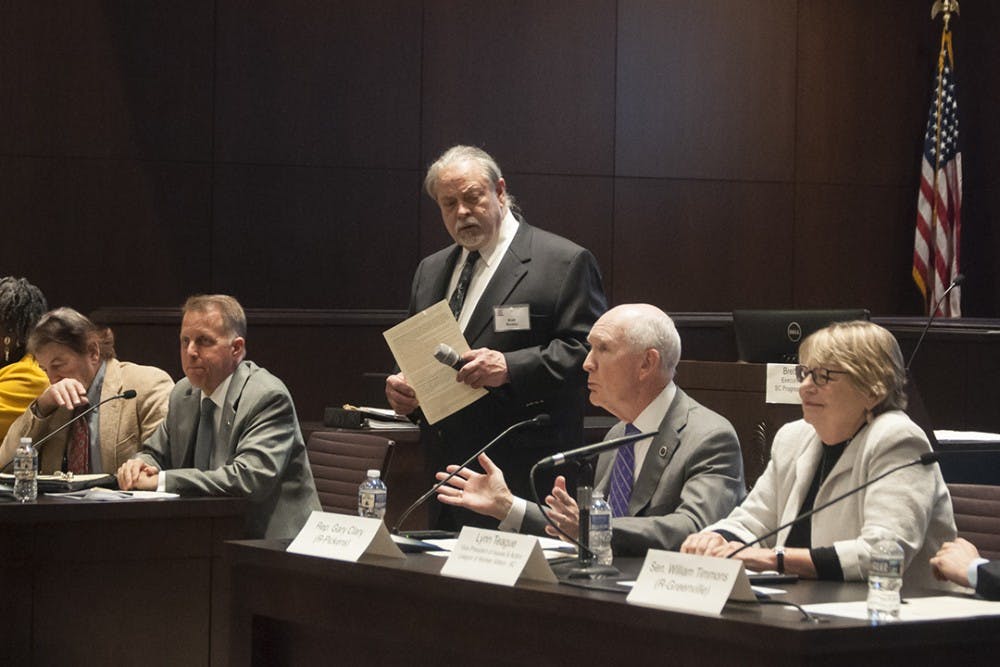The most common word heard in the USC School of Law on Tuesday night was "no-brainer."
But no matter how much they agreed on reducing corruption, the four legislators and two lobbyists on a panel discussing money in Palmetto State politics were pessimistic about the likelihood for legislative change in the remaining four months of this legislative session.
Panelists Rep. Gilda Cobb-Hunter (D-Orangeburg), Rep. Gary Clary (R-Pickens), Sen. Mike Fanning (D-Fairfield) and Sen. William Timmons (R-Greenville) were there to discuss nine bills that they've introduced, accompanied by Lynn Teague of the League of Women Voters South Carolina and John Crangle of the S.C. Progressive Network.
Marcurius Byrd, the president of the School of Law's American Constitution Society for Law and Policy, co-hosted the event with the Progressive Network.
"This was a great opportunity for us to work with them in the community and with the legislators," the third-year law student said.
Among the discussed bills — which range from redefining "lobbyist" to forcing criminal politicians to pay the costs of their replacements — few have a chance of reaching Gov. Henry McMaster's desk, let alone escaping the death sentence of being sent to a subcommittee.
According to moderator Brett Bursey of the S.C. Progressive Network, though, this is the best time for change — in the midst of a scandal over the October indictment of powerful GOP player Richard Quinn.
"Right now no one trusts the General Assembly," Fanning said. "The people deserve to have faith in us."
Beyond the five-year Quinn investigation that's expanded to include six lawmakers, South Carolina state government is routinely ranked among the worst states for integrity. It received an F from the Center for Public Integrity in 2012, moving up to a D- in 2015 when gerrymandering was removed from consideration.
Gerrymandering is essentially encouraged in South Carolina because the redistricting process is determined by the legislators themselves, which over the years has led to a district map where 77 percent of legislators faced no major opposition in the general election. Clary introduced a bill to create a citizens committee to redraw the map, but said it's unlikely to pass this session. Even on the panel, the system to choose the committee members quickly became an issue.
In response to a question about political bias on the committee, Timmons said, "Don't let the perfect be the enemy of the good."
Timmons, who campaigned in 2016 on the idea that state government is broken, discussed three pieces of legislation he's proposed — two of which he openly admitted were non-starters. The third would require all campaign contributions to be put into a specific type of bank account with the earned interest going to the State Ethics Commission. It's earned 17 co-sponsors, enough to get out of subcommittee and onto the Senate floor. The measure would earn about $100,000 for the commission, or 12 percent of its current appropriation.
Cobb-Hunter and Fanning would go a step further and give a cut of every campaign donation to the Ethics Commission. As their partner bills in the House and Senate stand, that cut is set at five percent, which would raise more than $500,000 annually. This bill, though, is much less likely to pass than Timmons', because it also includes public funding for attorney general candidates.
The bi-partisan panel did accomplish some actual progress; Cobb-Hunter said she'd incorporate Timmons' suggestion for judicial discretion on restitution payments into one of her bills.
According to Cobb-Hunter, though, real reform in South Carolina can't happen without public support: "Voters have shirked their responsibilities as voters."

